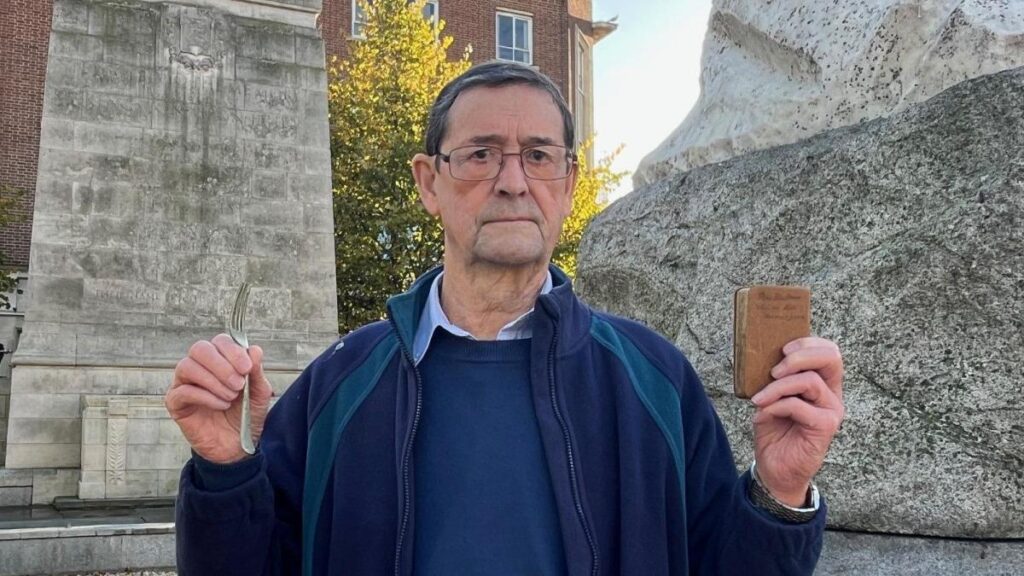In a poignant moment of reflection, David Balfour, an 84-year-old veteran, expresses his profound astonishment upon discovering a fork that belonged to his father, Pte Robert Balfour, who went missing in action during World War II. The fork, an emblem of his father’s service, was unearthed while renovating a house in Houdetot, a village in northern France. David, who was born shortly after his father’s disappearance in 1940, holds the fork tightly, imagining his father using it to eat his rations during the brutal conflicts of the war. For David, it represents the sole physical connection to his father, alongside his Army Bible. The fork bears the letters “BW” for the Black Watch regiment and his father’s service number, making it a significant artifact of personal and military history.
Pte Robert Balfour’s story is one of tragedy and loss, emblematic of the struggles faced by many during the early days of World War II. In June 1940, he fought with the British Expeditionary Force (BEF) in France and Belgium, but as Germany advanced, the BEF was forced to retreat, leading to the mass evacuation of Allied troops from Dunkirk and later Normandy. Pte Balfour was among those who did not return; his wife Doris was left with little information about her husband’s fate, initially told that he was missing in action before being informed a year later that he was likely killed around June 12, 1940. His body was never recovered, leaving Doris to grieve without closure.
The fork’s discovery occurred during renovations in a traditional Norman house, where it was found alongside two other forks, both marked with the same military insignia. The homeowner, unaware of their historical significance, reached out to local historians like Herve Savary, who recognized the British Army-issue cutlery and sought out Pte Balfour’s family. The discovery became a significant event for the Balfour family, culminating in a heartwarming reunion in Houdetot, where David was presented with his father’s fork alongside a jar of soil from the village. This gathering was a powerful reminder of the sacrifices made by soldiers like Pte Balfour, and the welcoming nature of the French community underscored a deep sense of gratitude for his service.
Reflecting on his father’s story, David Balfour shares cherished memories and photographs that depict his parents’ life together before the war. Married in 1938, his mother was only 18, and Robert was 25 when they wed. Life took a tragic turn when Robert was called back to service as a reservist at the outbreak of the war. David recounts how his father, along with other soldiers, was attempting to reach Le Havre for evacuation but was ultimately trapped by advancing German forces. Pte Balfour is one of the 4,528 soldiers from this campaign who are memorialized at the Dunkirk Memorial, having no known grave, which adds to the heartache of the families left behind.
In the context of the evacuation known as Operation Dynamo, which occurred from May 26 to June 4, 1940, the sheer scale of the operation becomes clear. A formidable fleet of naval and civilian vessels was mobilized to rescue Allied forces stranded on the beaches of Dunkirk, managing to save over 338,000 troops under heavy German aerial assault. This rescue operation stands as a testament to human resilience and the efforts to protect those who fought bravely against tyranny, despite the staggering losses experienced during that campaign.
As David holds the fork, his reflections deepen, pondering the life his father could have led had the war not intervened. He believes that the heirloom serves not only as a remembrance of his father’s bravery but also as a profound symbol of the family ties severed by conflict. The fork ignites feelings of sorrow mixed with honor, sketching a picture of a devoted husband and father lost too soon. Through personal artifacts and family narratives, the historical context of World War II becomes more personal, reminding us of the countless stories of sacrifice that define our shared history. The connection established through the fork highlights the enduring legacy of those who served, even in the face of despair, leaving an indelible mark on the hearts of their families.

